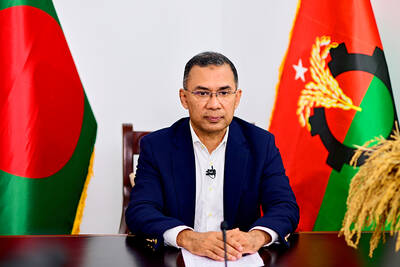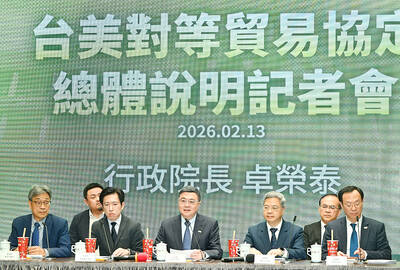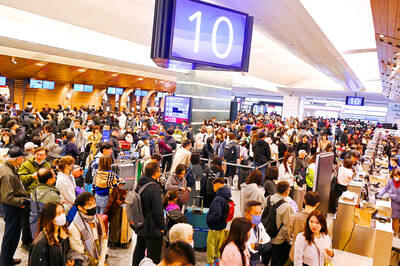Following years of inconclusive discussions, the heated debate on whether the National Palace Museum (故宮博物院) should set up a branch in southern Taiwan surfaced in the legislature again yesterday.
While proponents of the idea claim that the establishment of a branch in the south would help equalize the unbalanced cultural landscape in the northern and southern parts of of the country, those against the proposal remain skeptical.
They said the goal -- bridging the cultural rift between the two ends of the country -- would better be achieved by setting up museums on a smaller scale which would concentrate on displaying and preserving the local culture of those areas.
"The desire of people in the south -- to minimize the cultural gap between urban and rural districts -- is understandable. But I doubt the aim can be attained by setting up a branch of the National Palace Museum in the south," said DPP lawmaker Lin Cho-shui (林濁水).
"With a limited budget [earmarked for the promotion of cultural affairs], a better way of elevating the country's cultural standards is to clarify the purpose and role of existing museums, through which local culture and history can be better displayed, not to add more concrete buildings where nothing substantial is on display," Lin added.
Another DPP lawmaker, Chen Chin-jun (
"There are already 23 museums in the south of the country. The issue that the government needs to face is how to improve museums that already exist with the limited funding available, not to waste money on the construction of yet more museums," Chen said.
However, art scholars and lawmakers from the south viewed the issue differently.
DPP lawmaker William Lai (賴清德), independent lawmaker Josephine Chu (朱惠良), and Chang Yu-teng (張譽騰), an art professor at the Tainan National College of Arts, shared the notion that people from the south had long been treated unfairly by the government's biased policies on public buildings.
"Museum exhibits are national treasures, which should be admired equally by everybody," Chu said.
With regard to the complaint that people in the south are deprived of the convenience of visiting museums, Lin argued that the problem could be solved if the National Palace Museum was willing to lend its expositions to museums in the south.
The idea of setting up a branch of the museum in the south was first raised several years ago, when museum authorities said the 15,000 square meters facility in Taipei was insufficient for its 650,000 piece collection.
In contrast with the 70,000 square meters Metropolitan Museum of Art in New York, and the 60,000 square meters Musee du Louvre in Paris, the museum's deputy director, Shih Shou-chien (
Since Tu Cheng-sheng (杜正勝), the museum's director, took office last May, he has been lobbying the government to set up a branch in the south, primarily as a way of alleviating space constraints, and also to deflect criticism that the government has neglected the cultural needs of people in the south.

PEACE AT LAST? UN experts had warned of threats and attacks ahead of the voting, but after a turbulent period, Bangladesh has seemingly reacted to the result with calm The Bangladesh Nationalist Party (BNP) yesterday celebrated a landslide victory in the first elections held since a deadly 2024 uprising, with party leader Tarique Rahman to become prime minister. Bangladesh Election Commission figures showed that the BNP alliance had won 212 seats, compared with 77 for the Islamist-led Jamaat-e-Islami alliance. The US embassy congratulated Rahman and the BNP for a “historic victory,” while India praised Rahman’s “decisive win” in a significant step after recent rocky relations with Bangladesh. China and Pakistan, which grew closer to Bangladesh since the uprising and the souring of ties with India, where ousted Bangladeshi prime minister Sheikh Hasina

FAST-TRACK: The deal is to be sent to the legislature, but time is of the essence, as Trump had raised tariffs on Seoul when it failed to quickly ratify a similar pact Taiwan and the US on Thursday signed a trade agreement that caps US tariffs on Taiwanese goods at 15 percent and provides preferential market access for US industrial and agricultural exports, including cars, and beef and pork products. The Taiwan-US Agreement on Reciprocal Trade confirms a 15 percent US tariff for Taiwanese goods, and grants Taiwanese semiconductors and related products the most-favorable-treatment under Section 232 of the Trade Expansion Act, the Executive Yuan said. In addition, 2,072 items — representing nearly 20 percent of Taiwan’s total exports to the US — would be exempt from additional tariffs and be subject only to

NON-NEGOTIABLE: The US president’s action ran counter to one of the US’ ‘six assurances’ on not consulting China about arms sales to Taiwan, US lawmakers said US President Donald Trump’s admission that he is discussing arms sales to Taiwan with Chinese President Xi Jinping (習近平) is “alarming and a blatant violation of US policy and the six assurances,” US Representative Ro Khanna said on Tuesday. Trump on Monday said he would decide soon on whether to send more weapons to Taiwan, after Xi warned him not to do so. “I’m talking to him about it. We had a good conversation, and we’ll make a determination pretty soon,” Trump told reporters aboard Air Force One when asked about warnings raised by Beijing during a phone call with Xi over

HOLIDAY RUSH: Airport passenger volume is expected to reach a new high, while southbound road traffic would likely peak from Tuesday As Lunar New Year travelers flock overseas, passenger traffic at Taiwan Taoyuan International Airport is expected to shatter records, as Taoyuan International Airport Corp (TIAC, 桃園國際機場), Taiwan’s largest aviation hub operator, projected yesterday’s passenger volume to climb to 167,000. The figure comes after a record single-day high of 161,000 passengers on Thursday, and would surpass the previous pre-COVID-19 pandemic Lunar New Year peak of 166,000 passengers in 2019, TIAC said. Long lines could be seen forming as early as 7am yesterday, filling Terminal 1 of the airport almost to capacity, yet security checks took only 10 to 15 minutes. TIAC urged